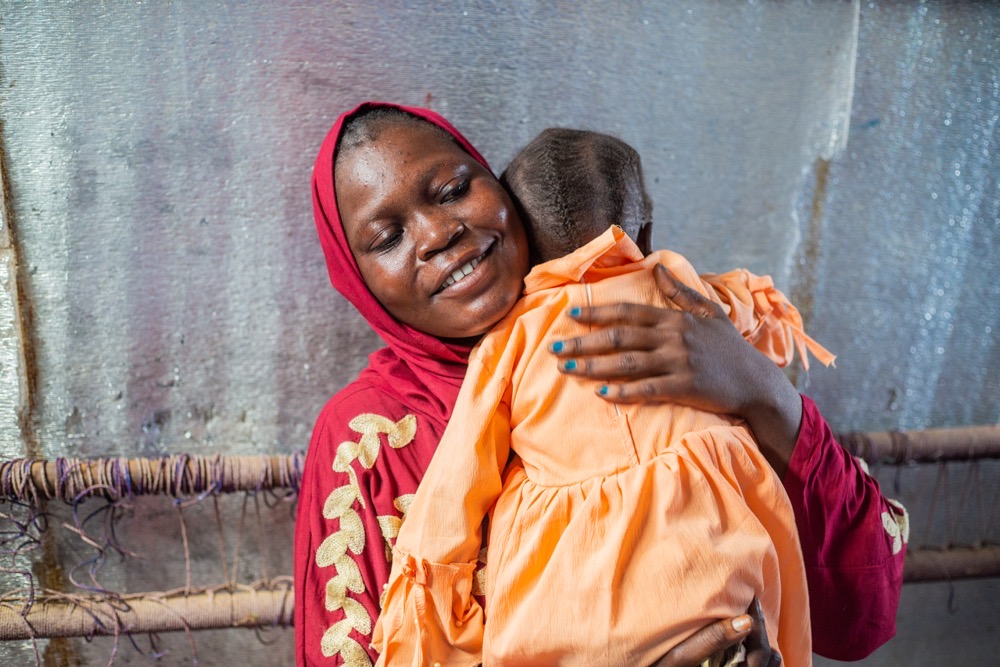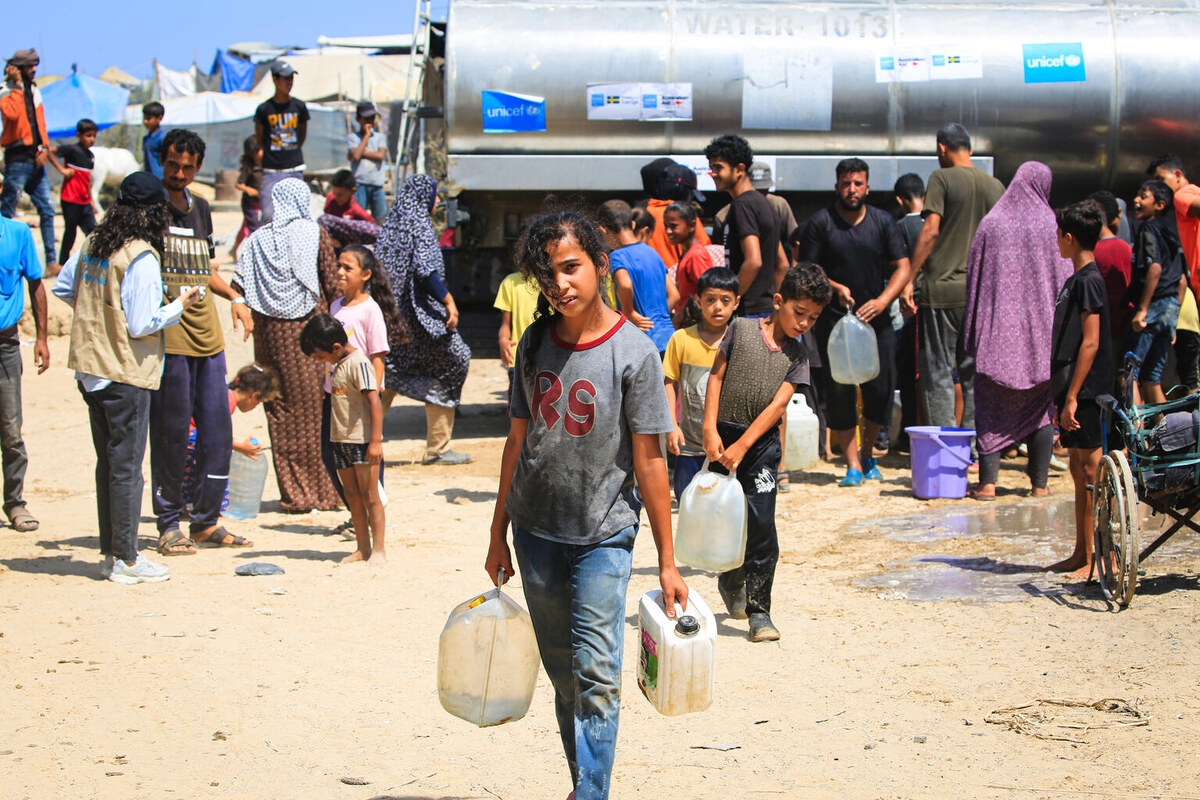LONDON: The private sector must move from the “periphery” to become a “powerhouse” in supporting and funding international bodies and their programs if the UN’s 17 sustainable development goals are to be met by 2030, according to Carla Haddad Mardini, UNICEF’s director of private fundraising and partnerships.
In an exclusive interview with Arab News ahead of the UN General Assembly in New York, Haddad Mardini said more needed to be done to bridge funding gaps for the SDGs so that the world could take a holistic, preemptive approach to tackling emerging crises, especially those disproportionately affecting children in regions such as the Middle East and North Africa.
“The UN General Assembly is becoming a space where the private sector comes en masse,” she said.
“What it says is that the private sector is stepping up and keen to engage and we just need to make sure they’re not always on the periphery, but that they’re brought into the mainstream discussions to really drive change and scale when it comes to some of the most important global challenges.

“Whether it’s climate, whether it’s multidimensional poverty, the learning crisis, pandemics, epidemics, health systems — strengthening all those big issues that require, really, government and private sector multinationals to engage.”
Lebanese-born Haddad Mardini, who has headed the private fundraising division at the UN children’s fund since 2021, painted a grim picture of the situation facing children around the world, especially in the MENA region.
“We have 1.2 billion children … living in multi-dimensional poverty — 600 million do not meet minimum reading standards, 35 million suffer from malnutrition and wasting, and a quarter of the world’s children live or have fled from conflict zones,” she said.
FASTFACTS
• UN’s sustainable development goals consist of 17 global objectives to end poverty and protect the planet.
• Adopted in 2015, the SDGs to be achieved by 2030 target health, education, equality and the environment.
• Goals emphasize partnerships between governments, businesses and civil society.
The numbers are stark, exacerbated by what UNICEF calls a “permacrisis” of conflicts around the world coinciding with natural disasters, exacerbating poverty.
The aid organization is seeking unrestricted, flexible funding from its private sector partners to respond to emergencies, address foreseeable challenges ahead of time and to build structural resilience in vulnerable parts of the world.

As governments tighten their aid budgets, humanitarian agencies have been forced to diversify their partnerships in order to meet the ever growing demand.
“The big issue for UNICEF is the sustainability of funding,” Haddad Mardini said. “Everything is interconnected. So our big worry is sustaining funding to reach the SDGs — and all the SDGs are interconnected. If you make a dent on one SDG, there is a knock-on effect on the other. If we’re failing several SDGs, most of them will not advance.”
Established in 2015, the SDGs encompass action on building infrastructure, creating digital connectivity, water security and providing sanitation, healthcare and education, as well as conserving the environment.
Despite near universal agreement among governments about the importance of achieving all 17 by 2030, the coronavirus pandemic and a wave of political upheaval over the past decade has caused several donor countries to shift their priorities.
Haddad Mardini highlighted the European migration crisis, the war in Ukraine and the impact of the pandemic on health systems as among the reasons why some governments have become more cautious with their aid spending in recent years.

“What keeps UNICEF awake at night is also the funding situation of our humanitarian and development operations,” she said. “There is attention that is paid to one area and the media cycle drives that and then the rest of the world is completely neglected or forgotten and the partners and the donors react to what is happening in the media.
“So what we’re striving for is long-term sustainable income and support to UNICEF that is multiyear and that is flexible, so we can cater to the needs of children when they arise and that we can honor our equity agenda. Otherwise we would become an organization that services some children somewhere and not every child everywhere.

“We’re seeing this happening in front of our eyes today with different cycles of emergencies. We saw what happened in Sudan, specifically one of the hardest situations for children in years — we’ve never seen the level of violence that we’ve seen in Sudan. We (also) know what is happening in Gaza on a daily basis, the situation of children there.”
Supporting children is not only a central moral issue but an economic one as well, as educational deficiencies and a lack of access to healthcare are key drivers of intergenerational poverty.
Although the Gulf states have made the well-being of their young people a key area of policy, other countries in the MENA region are struggling to provide security, good health and opportunities to their children.
“Whether it’s in Syria, Lebanon, the state of Palestine, Sudan, Yemen, I mean, you name it, the whole Middle East is kind of on fire,” Haddad Mardini said.
INNUMBERS
• $4tn The SDG investment gap in developing countries per year.
• 120m Forcibly displaced people worldwide as of May 2024.
• 72% Surge in civilian casualties of war between 2022 and 2023.
(Source: UN)
“The priority is to make sure children can survive. So of course you have the lifesaving operations and there you think of health, nutrition, access to water and hygiene, the basic essential services to allow children to survive.”
A particular priority for UNICEF, however, is education — something that is often overlooked during an emergency response.
“For us in UNICEF, education is also a lifesaving intervention, so we want them to keep learning,” Haddad Mardini said.

“There are moments where it’s impossible, of course — if you’re in a bunker and you’re under bombardments or airstrikes — but we will do everything we can to keep them learning, whether in a school setup or digitally, to make sure they don’t lose out and they don’t drop out from school and that they can continue their learning.
“One of the biggest challenges is if you don’t get the basic numeracy and literacy in the first years, this is lost forever. It’s very hard to catch up afterwards.”
Mardini Hadded highlighted the case of Syria, where civilian suffering brought about by 13 years of civil war has been compounded by the pandemic, natural disasters, climate pressures and economic crisis.
“If we look at Syria, what happened on top of everything? You have an earthquake hitting the area. So it’s the compounded effects of climate shocks, war and armed conflict and violence and health systems that are crumbling,” she said.

“Our interventions really need to make sure that a child can survive and potentially thrive and education is at the heart of it. But of course, the first and most important thing is access to healthcare and having basic nutrition to make it to the next day.”
Fortunately, the flexible funding approach has already borne fruit in the region.
On Sept. 13, against the backdrop of the ongoing war between Israel and the Palestinian militant group Hamas, UNICEF announced it had successfully administered more than 560,000 polio vaccines to children aged under 10 across the Gaza Strip in just 12 days.
Meanwhile, with Israel and the Iran-backed Hezbollah militia trading blows along the Lebanese border, $2 million in flexible funds was spent in November 2023 to help scale up and supply Lebanon’s Rapid Response Mechanism.

In Yemen, thousands of critical supply items were also recently procured to assist displaced children, while in South Sudan, flexible funding has allowed UNICEF to spend $1.4 million to help 134,250 women and children escape the ongoing conflict.
But Haddad Mardini warned individual efforts could not achieve the same progress as a global approach.
“We don’t want to go for small attempts, small projects here and there,” she said.
“We really need a combination of public sector, private sector, the international financial institutions, such as the World Bank and many others in Asia, Africa, the Middle East, Latin America, to join forces and take the work to scale when it comes to the SDGs.”



























